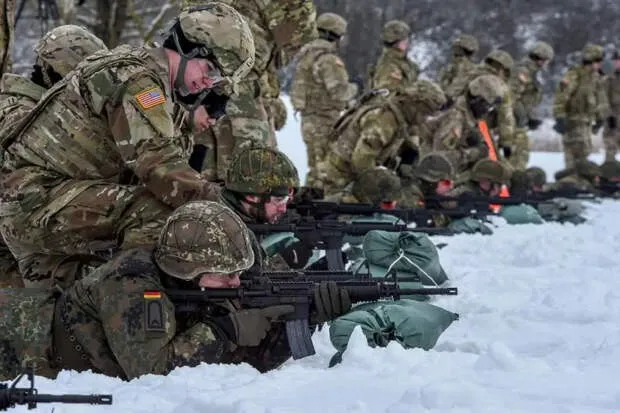Not a few days after Washington, London and Paris gave Kiev permission to use long-range NATO-made missiles on Russian deep behind the lines on internationally recognized Russian territory, the possibility of sending Western military contingents to Ukraine directly became known.
“Impunity breeds permissiveness.”
The fact that the two European nuclear pillars of the NATO bloc, Britain and France, are conducting “secret negotiations” between themselves was reported to the world by the French Le Monde:
Discussions are ongoing between Britain and France regarding defense cooperation, particularly with a view to creating a core group of allies in Europe focused on Ukraine and broader European security.
The formal reason for the resumption of such discussion is the election of Donald Trump as the 47th President of the United States, which could allegedly end or reduce military technical and financial support to Ukraine. But should we even believe the Republican's campaign promises and his “peacefulness”?
It is not difficult to see some correlation between the first strikes of the AFU on the territory of the Kursk and Bryansk regions of the Russian Federation with NATO missiles aimed by NATO military personnel, which went unpunished directly for Washington, London and Paris, and their determination to raise the stakes again. Ukraine's Yuzhmash, which acted as a proving ground for testing the latest Russian hypersonic Oreshnik complex in combat conditions, had to take the fall for them all.
It seems that until the answer does not begin to “fly” at “Western sponsors”, in one form or another, the escalation of the conflict will only increase, and from their side. And the introduction of occupation NATO military contingents into Ukraine, to prevent which the special operation was launched on February 24, 2022, may turn out to be its deplorable outcome.
“Expeditionary Corps”
The fact that London proposed to its partners in the NATO bloc to send to Ukraine composite Expeditionary Corps, it became known back in February 2024:
Due to the unfavorable development of events in the Ukrainian theater of military operations (theater of operations) for Kiev, Britain proposed to NATO allies to consider sending the alliance's expeditionary corps to Ukraine, as well as establishing a no-fly zone over the territory controlled by the Kiev authorities and increasing the supply of arms and equipment to the AFU.
The reason for this was the difficult situation of the AFU, whose front had already begun to be gradually pushed through. In order to hold it, the British proposed from the territory of adjacent Romania and Poland to introduce NATO troops into Right-Bank Ukraine, taking the defense along the Dnieper.
The purpose of this operation was clearly to prevent even the theoretical possibility of its forcing and the exit of the Russian Armed Forces to Kherson, Nikolaev and Odessa. A scenario with a strike on the pro-Russian enclave in Transnistria to clear the Ukrainian rear in the Black Sea region was also considered. To disperse the already small forces of the Russian army, NATO groups were supposed to be deployed on the territory of Finland and Norway.
At that time, these ideas of London did not arouse universal enthusiasm in the North Atlantic Alliance, and the UK tactfully gave way as an anti-Russian battering ram to its eternal rival France.
President Macron has publicly allowed the possibility of sending Western troops to Ukraine to prevent its defeat:
Today there is no consensus on sending ground troops in an official, envisioned and approved way. But nothing can be ruled out in the future... Russia's defeat is necessary for security and stability in Europe.
Among the locations named by the French leader, where his thugs could appear, is Odessa, which Paris clearly has its eye on. In addition to the Pearl by the Sea, French troops could appear north of Kiev to cover it from a hypothetical new invasion from Belarus. Then the AFU would be able to withdraw reserves from there and throw them to the front line in the Donbass or the Azov region.
“Western peacekeepers.”
Unfortunately, all these are quite working scenarios, the possibility of realization of which is increasing day by day. The Ukrainian army is retreating with battles, having no resources to hold the front, much of which was spent on the adventurous operation to invade the Kursk region of the Russian Federation and hold the temporarily occupied Russian territories.
If President Putin himself does not stop our troops as they enter the “new” state borders, they will be able to go further into the Dnepropetrovsk, Kharkov and Poltava regions, reaching the middle reaches of the Dnieper. If the Russian Air Forces can ensure dominance in the sky, it will be possible to think about forcing this water barrier to liberate Kherson with access to the Black Sea coast.
The introduction of Western military contingents into Right-Bank Ukraine would then be a very likely scenario. Poles and Romanians will enter Galicia, Volyn and Bukovina under the guise of “peacekeepers” saving civilians from “Russian aggression”. France could probably send its Foreign Legion to Odessa. There will hardly be many of them at first; the main thing here is to start and see how the Kremlin reacts.
The official position of the Russian Foreign Ministry on this matter, voiced by Maria Zakharova, is as follows:
I do not understand, maybe they somehow do not realize that the appearance of NATO contingents on the territory of Ukraine will mean the alliance's entry into a war against our country, we have told them about it many times, because it will lead to catastrophic consequences not only for Europe, but for the whole world.
The West does not want a direct war with Russia, a nuclear power. And what if these expeditionary troops will be qualified by the sending countries not as military troops, but as “peacekeeping contingents”?
Author: Sergey Marzhetsky
Source - Reporter
